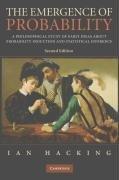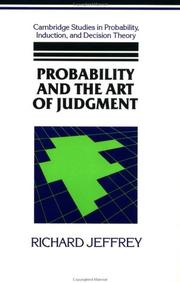| Listing 1 - 2 of 2 |
Sort by
|

ISBN: 9780521685573 9780521866552 0521866553 0521685575 9780511817557 1107264111 051181755X Year: 2006 Publisher: Cambridge : Cambridge University Press,
Abstract | Keywords | Export | Availability | Bookmark
 Loading...
Loading...Choose an application
- Reference Manager
- EndNote
- RefWorks (Direct export to RefWorks)
Historical records show that there was no real concept of probability in Europe before the mid-seventeenth century, although the use of dice and other randomizing objects was commonplace. Ian Hacking presents a philosophical critique of early ideas about probability, induction, and statistical inference and the growth of this new family of ideas in the fifteenth, sixteenth, and seventeenth centuries. Hacking invokes a wide intellectual framework involving the growth of science, economics, and the theology of the period. He argues that the transformations that made it possible for probability concepts to emerge have constrained all subsequent development of probability theory and determine the space within which philosophical debate on the subject is still conducted. First published in 1975, this edition includes an introduction that contextualizes his book in light of developing philosophical trends. Ian Hacking is the winner of the Holberg International Memorial Prize 2009.
Philosophy of science --- Probabilities --- Induction (Mathematics) --- Mathematical statistics --- History. --- Arts and Humanities --- Philosophy --- Induction (Logic) --- Mathematics --- Mathematical induction --- Probabilités --- Induction (mathématiques) --- Statistique mathématique --- Histoire --- History

ISBN: 0521397707 0521394597 1139172395 9781139172394 Year: 1992 Publisher: Cambridge : Cambridge University Press,
Abstract | Keywords | Export | Availability | Bookmark
 Loading...
Loading...Choose an application
- Reference Manager
- EndNote
- RefWorks (Direct export to RefWorks)
Richard Jeffrey is beyond dispute one of the most distinguished and influential philosophers working in the field of decision theory and the theory of knowledge. His work is distinctive in showing the interplay of epistemological concerns with probability and utility theory. Not only has he made use of standard probabilistic and decision theoretic tools to clarify concepts of evidential support and informed choice, he has also proposed significant modifications of the standard Bayesian position in order that it provide a better fit with actual human experience. Probability logic is viewed not as a source of judgment but as a framework for explaining the implications of probabilistic judgments and their mutual compatability. This collection of essays spans a period of some 35 years and includes what have become some of the classic works in the literature. There is also one completely new piece, while in many instances Jeffrey includes afterthoughts on the older essays.
Stochastic processes --- Bayesian statistical decision theory --- Induction (Logic) --- Judgment. --- Probabilities --- Probabilities. --- Bayesian statistical decision theory. --- Induction (Logic). --- Arts and Humanities --- Philosophy --- Probability --- Statistical inference --- Combinations --- Mathematics --- Chance --- Least squares --- Mathematical statistics --- Risk --- Judgement --- Knowledge, Theory of --- Language and languages --- Psychology --- Thought and thinking --- Wisdom
| Listing 1 - 2 of 2 |
Sort by
|

 Search
Search Feedback
Feedback About
About Help
Help News
News